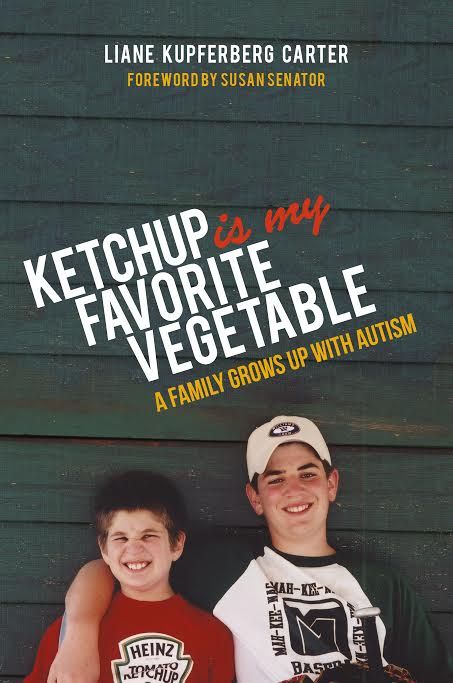Anxiety
Anxiety & the Special Needs Parent
How to tame fear & parent with courage - a Q & A with Liane Kupferberg Carter
Posted March 21, 2016
If parenting can feel like a roller coaster of anxiety, then special needs parenting is a whole carnival. One where the rides never stop and you are always juggling fire. In Ketchup is My Favorite Vegetable: A Family Grows Up With Autism, (Jessica Kingsley Publishers) author Liane Kupferberg Carter offers a candid, in-the-thick-of-it view of raising two sons, Jonathan and Mickey, into adulthood. Mickey is autistic and has epilepsy. There is plenty to worry about, and Liane doesn’t sugarcoat the anxiety, frustration and pain they all feel at times. But in choosing to operate from a place of hope and strength, she is able to not just navigate Mickey’s needs, but embrace each moment and develop his potential for the future. The result is a deeply moving and inspiring look at a mother’s love beyond fear. Liane was kind enough to answer questions for “Some Nerve” readers at PsychologyToday.com.

SN: Anxiety and the special needs parent go together like a horse and carriage, don’t you think? It can be hard to tell which is in control!
LC: When I was a kid, one of my favorite books was The Emerald City of Oz. The Wizard shows Dorothy a town called Flutterbudget Center, where people worry constantly. They begin every statement with “if.” As the parent of a special needs child, it’s very easy to let the “what ifs” run away with you. I could be the mayor of Flutterbudget Center.
SN: You had so many legitimate fears for Mickey - for his physical health, his emotional development, and his ability to build independent life skills - how did you manage all the anxiety and not let it paralyze you?
LC: Those early years were difficult. We struggled to create an ordinary family life while dealing with the extraordinary needs of an autistic child. I often thought of the poster that hung on my wall in college that said, “Feel the fear and do it anyway.”
I channeled my anxiety into actions: Deal with his dental phobia. Check out a social skills program. Set up a special needs trust. We didn’t try to boil the ocean – you can’t do everything at once. Better to set priorities, and chunk the challenges into manageable tasks. But do everything you can to keep from getting paralyzed. When people ask, how did you do it? I always give the same answer: We did it because we had to. My husband and I had to be Mickey’s advocates; we were in it for the long haul.
I also took time to enjoy Mickey every day, just as I did his older brother Jonathan. We celebrated every one Mickey’s accomplishments. Many of his milestones were hard-won, so we never took any of them for granted. I was determined not to let my fears of the future rob me of the pleasures of the present.
SN: Is there anything you feared that you now wish you hadn't wasted energy on?
LC: One of the many things I obsessed over for years was how to help him fit in. Therapists urged us to “make Mickey look as normal as possible” by having age appropriate interests. And today he does have some: for example, he loves watching sports and reads the standings in the New York Times every morning. But he also still watches Nickelodeon. I wish now I hadn’t invested so much energy in trying to change him. Maybe wanting him to be more age-appropriate said more about my own comfort level than about Mickey’s development. So what if his interests don’t fit someone else’s idea of appropriate? If carrying a small Sesame Street Grover in his pocket makes him feel safe, why shouldn’t he? I’ll choose “happy” over “normal” any day.
SN: Many parents of children who are visibly different are afraid of what others will think of their parenting. Did you feel this keenly and how did you learn to not let it bother you as much?
LC: Initially it made me shrivel inside when people stared at my son. It pierced my armor and sliced straight to my heart. The looks felt so accusatory: He’s acting like a brat, why can’t you just control him? What’s wrong with him? Even worse were the there-but-for-the-grace-of God-go-I, oh-what-a-tragedy looks. I told myself to ignore it. Maybe I got used to it, or grew thicker skin. Now I am able to see that sometimes those stares are actually ones of understanding and support, not disapproval. Having a child with special needs is a humbling experience. It taught me never to judge any other parent whose kid is acting up in public.

SN: Like many parents of special needs kids you also had fear of something bad happening to you, because then who would take care of Mickey? "I have to live forever" became your mantra. Did this fear motivate you in positive ways to take care of yourself for the long haul?
LC: Absolutely. There was a study several years ago in the Journal of Autism and Developmental Disorders that found that mothers of adolescents and adults with autism experience chronic stress levels comparable to that of combat soldiers. You know how on airplane, the flight attendant tells you that if the oxygen mask drops down, to put on your own oxygen mask first before putting it on your child? Otherwise you risk blacking out before you can help anyone else. I learned early on that I was no good to my kids if I didn’t stay healthy and strong. That didn’t mean indulgent spa vacations. It was basic stuff. Making time to exercise. Eat well. Sleep more than six hours a night. Schedule date nights with my husband. Self-care is imperative.
SN: Any other advice for special needs parents to cope with the anxiety they feel?
LC: Humor, at times gallows humor, saved me. Cracking jokes is my version of whistling past the graveyard. But it also feels rich and restorative. My best advice for parents of special needs kids is to seek out other special needs parents. When I finally connected with them after those first hard years, it felt as if I could take a deep breath after holding it too long. They will validate your feelings, make you laugh, and support you when you are down. They are the ones who really, truly get it.
How did Liane Kupferberg Carter face the fear of writing a deeply personal family memoir and opening herself up to the public? Take a look at "Fear of Writing: Family Memoir" at Facing Forty Upside Down.
Want anxiety busting tips delivered to your email box? Join the Some Nerve mailing list.




